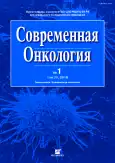The use of low molecular weight heparin Enixum® in the prevention and treatment of thrombosis in oncology
- Authors: Somonova OV1, Elizarova AL1, Matveeva II1
-
Affiliations:
- N.N.Blokhin National Medical Research Center of Oncology of the Ministry of Health of the Russian Federation
- Issue: Vol 20, No 1 (2018)
- Pages: 29-34
- Section: Articles
- URL: https://bakhtiniada.ru/1815-1434/article/view/27164
- ID: 27164
Cite item
Abstract
Full Text
##article.viewOnOriginalSite##About the authors
O V Somonova
N.N.Blokhin National Medical Research Center of Oncology of the Ministry of Health of the Russian Federation
Email: somonova@mail.ru
д-р мед. наук, вед. науч. сотр. 115478, Russian Federation, Moscow, Kashirskoe sh., d. 23
A L Elizarova
N.N.Blokhin National Medical Research Center of Oncology of the Ministry of Health of the Russian Federationканд. биол. наук, ст. науч. сотр. 115478, Russian Federation, Moscow, Kashirskoe sh., d. 23
I I Matveeva
N.N.Blokhin National Medical Research Center of Oncology of the Ministry of Health of the Russian Federationд-р мед. наук, зав. клинико-диагностической лаб. 115478, Russian Federation, Moscow, Kashirskoe sh., d. 23
References
- Trousseau A. Phlegmasia Alba Dolens. Lectures on clinical medicine, delivered at the Hotel-Dieu. Paris, London: New Sydenham Society, 1872.
- Agnelli G, Verso M. Management of venous thromboembolism in patients with cancer. J Thromb Haemost 2011; 9 (Suppl. 1): 316-24.
- Geerts W.H, Pineo G.F, Heit J.A et al. Prevention of venous thromboembolism. The Seventh ACCR Conference on Antithrombotic and Thrombolytic Therapy. Chest 2004; 126 (Suppl.): 338S-400S.
- Kakkar A.K, Haas S, Walsh D et al. Prevention of perioperative venous thromboembolism: outcome after cancer and non-cancer surgery (abstract). Thromb Haemost 2001; 86 (Suppl.): 0c1732.
- Barsam S.J, Patel R, Arya. Anticoagulation for prevention and treatment of cancer-related venous thromboembolism. Br J Haematol 2013; 161 (Iss. 6): 764-77.
- Amin C, Mackman N, Key N.C. Microparticles and cancer. Pathophysiol Haemost Thromb 2008; 36: 177-83.
- Magnus N, D’Asti E, Meehan B et al. Oncogenes and the coagulation system - forses that modulate dormant and aggressive states in cancer. Thromb Res 2014; 133 (Suppl. 2): S1-S9.
- Lee A.Y. The roles of anticoagulants in patients with cancer. Thromb Res 2010; 125 (Suppl. 2): S8-S11.
- Levine M.N, Lee A.Y, Kakkar A.K. Thrombosis and cancer. American Society of Clinical Oncology, 41 Annual Meeting, 2005; p. 748-77.
- Hirsh J, Warkentin T.E, Shaughnessy S.G et al. Heparin and low molecular weight heparin: mechanisms of action, pharmacokinetics, dosing, monitoring, efficacy and safety. Chest 2001; 119 (Suppl. 1): 64S-94S.
- Hirsh J, Anand S.S, Halperin J.L, Fuster V. Guide to Anticoagulant therapy: Heparin. A Statement for healthcare Professionals from the American Heart Association. Curculation 2001; 103 (24): 2994-3018. PubMed PMID: 11413093.
- Mismetti P, Laporte S, Darmon J.Y. et al. Meta-analysis of low-molecular- weight heparin in the prevention pf venous thromboembolism in general surgery. Br J Surg 2001; 88: 913-30.
- Lyman G.H, Bohlke K, Khorana A.A et al. Venous thromboembolism prophylaxis and treatment in patients with cancer: ASCO clinical Practice Guideline Update 2014. J Clin Oncol 2015; 33: 654-6.
- Kuderer N.M, Lyman G.H. Guidelines for treatment and prevention of venous thromboembolism among patients with cancer. Thromb Res 2014; 133 (Suppl. 2): S122-S127.
- Mandala M. Management of venous thromboembolism in cancer patients. ESMO Clinical Practice Guidelines. Ann Oncol 2011; 22 (Suppl. 6): vi85-vi92.
- Kearon C, Akl E.A, Ornelas J et al. Antithrombotic therapy for VTE disease. Chest 2016; 149 (2): 315-52.
- Российские клинические рекомендации по диагностике, лечению и профилактике венозных тромбоэмболических осложнений (ВТЭО). Флебология. 2015; 4 (2): 2-52
- Guyatt G.H, Akl E.A, Growther M et al. Executive Summary. Antithrombotic therapy and Prevention of Thrombosis, 9th ed: ACCP evidence-based clinical practice guidelines. Chest 2012; 141 (Suppl. 2): 7S-47S.
- Watson H.G, Keeling D.M, Laffan M et al. Guedeline on aspects of cancer-related venous thrombosis. British J Haematology 2015; 170 (Iss. 5): 640-8.
- Lee A.Y, Levine M.N., Baker M.D et al. Low-Molecular-Weight Heparin versus a Coumarin for the prevention of recurrent venous thromboembolism in patients with cancer. New Eng J Med 2003; 349: 146-53.
- Kearon C, Akl E.A, Comerota A.J et al. Antithrombotic therapy for VTE disease: Antithrombotic therapy and prevention of thrombosis, 9th ed. American College of Chest Physicians Evidence - Based Clinical Practice Guidelines. Chest 2012; 141 (2): 419S-430S.
Supplementary files







